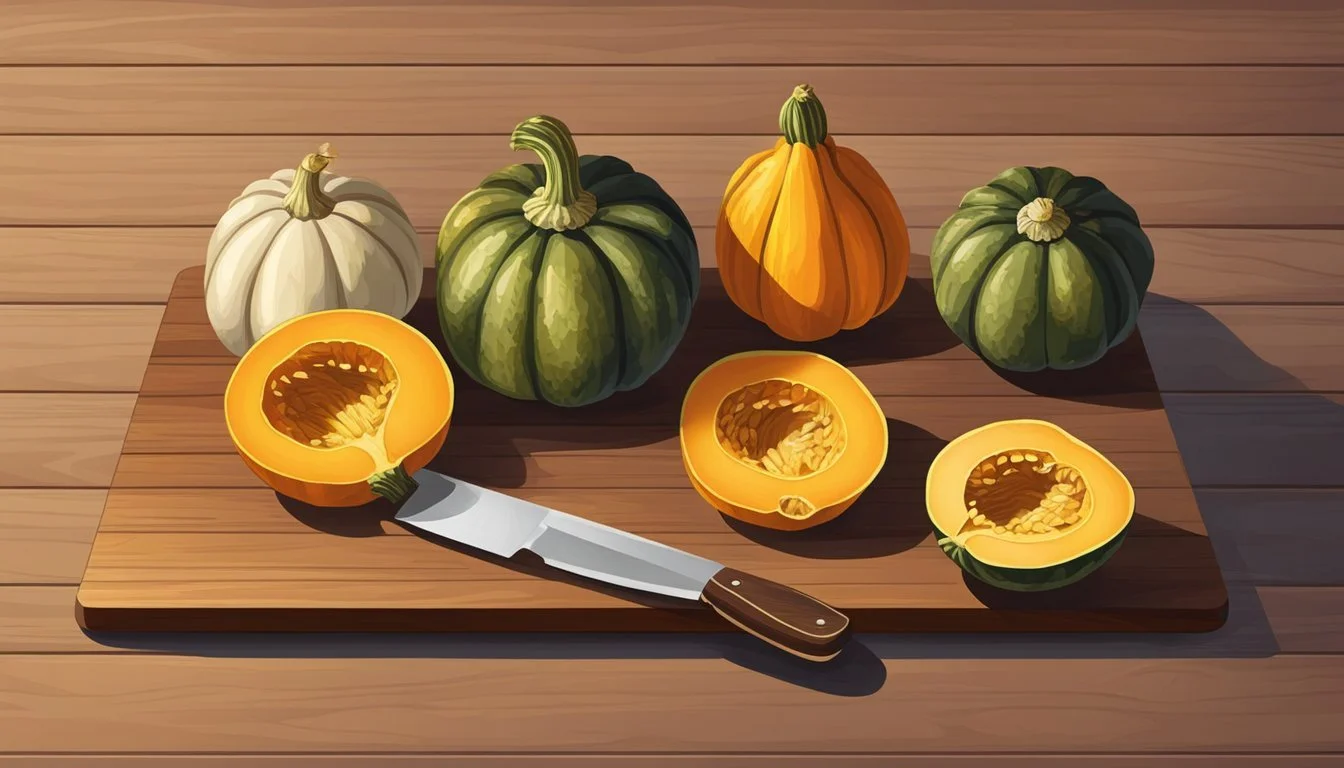Carnival Squash Substitutes
Top Alternatives for Your Recipes
When you're out of carnival squash or it's off-season, it's essential to know the best substitutes to keep your recipes flavorful and nutritious. Butternut squash is an excellent alternative due to its sweet flavor and substantial nutritional benefits, including high levels of dietary fiber, vitamin A, and potassium. Acorn squash can also serve as a great substitute, offering a similar shape and additional nutrients like vitamin C and magnesium.
For those looking for a different texture and taste, sweet potatoes are another viable option. They're rich in iron and folate, making them a nutritious choice for various dishes. Kabocha squash, with its nutty and sweet flavor, can easily replace carnival squash in soups and roasts, providing a hearty dose of vitamins and minerals.
Experimenting with these substitutes can keep your dishes exciting and nutritious. Whether you're preparing a comforting winter recipe or a vibrant summer meal, there's always a suitable alternative to carnival squash that will satisfy your culinary needs.
Understanding Carnival Squash
Carnival squash is a visually appealing and nutritious winter squash that is used in various culinary applications. It is recognized for its unique characteristics, diverse nutritional benefits, and versatility in cooking.
Characteristics of Carnival Squash
Carnival squash is a hybrid variety derived from sweet dumpling and acorn squashes. It is distinctive with its cream-colored background adorned with stripes and speckles of green and orange. As it matures, the green tends to fade, leaving behind the cream and orange hues.
The squash is about the size of a large grapefruit and has a dense, firm texture. The rind is hard but edible when cooked. Inside, its flesh is golden-yellow and has a nutty flavor that is slightly sweet.
Nutritional Profile
Carnival squash is packed with numerous nutrients that contribute to a healthy diet. It is a good source of Vitamin A, which is crucial for vision and immune function, and Vitamin C, known for its antioxidant properties.
It also provides potassium, aiding in muscle function and fluid balance, and dietary fiber, supporting digestive health. Other notable nutrients include magnesium, iron, and folate. It is low in fat and calories, making it a healthy choice for various dishes.
Nutrient Amount (per 100g) Vitamin A 488 µg Vitamin C 12 mg Potassium 437 mg Dietary Fiber 3 g Magnesium 24 mg Iron 0.6 mg Folate 24 µg
Culinary Uses
Carnival squash is incredibly versatile in the kitchen. Its mildly sweet, nutty flavor pairs well with both savory and sweet recipes. It can be roasted, which brings out its natural sweetness and caramelizes its sugars.
It is also excellent in soups, adding a creamy texture and rich flavor. The squash can be baked and stuffed with grains or meats, making for hearty main dishes. Additionally, it can be used in salads, side dishes, and even baked goods like muffins and bread for a unique twist.
Common Substitutes for Carnival Squash
When you can't find carnival squash, several other varieties offer similar flavors and textures. Each substitute has unique characteristics suited for different types of dishes, from soups to roasting.
Butternut Squash as a Substitute
Butternut squash is an excellent alternative to carnival squash due to its creamy texture and sweet, nutty flavor. It is high in fiber, potassium, vitamin C, and other essential nutrients. If you're making soups or stews, butternut squash blends smoothly when pureed. For roasting, its dense flesh caramelizes nicely. Butternut squash can also be used in baked goods, adding natural sweetness and moisture.
Acorn Squash Alternatives
Acorn squash also works as a carnival squash substitute. Its mild, slightly fibrous texture and sweet taste make it versatile for various recipes. Like carnival squash, it can be roasted, stuffed, or incorporated into soups. Acorn squash holds its shape well when baked, making it ideal for dishes requiring the vegetable to serve as a vessel. Unfortunately, the rind isn't as tender as some other varieties, so peeling might be necessary.
Delicata Squash Options
Delicata squash is another great substitute for carnival squash. Known for its thin, edible rind and sweet, buttery flesh, delicata squash requires minimal preparation. It roasts beautifully, developing a creamy interior and caramelized exterior. Its small size and convenient shape make it perfect for slicing into rings or half-moons. Delicata is excellent in roasting, sautéing, or as an addition to salads and soups.
Other Squash Varieties
Other suitable substitutes include kabocha squash, sweet dumpling squash, and spaghetti squash. Kabocha squash has a dense, sweet flesh and works well in soups and stews. Sweet dumpling squash is similar in sweetness and texture to carnival squash, making it ideal for roasting or stuffing. Spaghetti squash, with its unique stringy texture, is suitable for dishes where a fibrous, slightly crunchy element is desired. Finally, hubbard and buttercup squashes provide a sweet, dense alternative, excellent for baking and roasting recipes.
Non-Squash Alternatives
When looking for substitutes for carnival squash, consider root vegetables and unique options that offer similar flavors and textures. These alternatives can be just as versatile and flavorful in your recipes.
Root Vegetable Replacements
Sweet Potato: Sweet potatoes bring a naturally sweet flavor similar to carnival squash. They have a tender flesh when cooked and work well in roasting, mashing, or soups. Their vibrant orange color adds visual appeal to dishes.
Carrots: Carrots are another excellent option due to their sweetness and versatility. They can be roasted, pureed, or used in stews. Carrots also add a pop of color, making dishes more visually appealing.
Potatoes: Regular potatoes offer a more neutral taste and starchy texture. They can fill in for carnival squash in recipes where the sweet flavor is not critical, providing a hearty element to dishes.
Unique Substitutes
Sugar Pumpkin: Sugar pumpkins, also known as pie pumpkins, have sweet, smooth flesh. They work well in baked goods, soups, and stews. These pumpkins provide a rich flavor profile similar to carnival squash.
Japanese Pumpkin (Kabocha): Kabocha squash, with its sweet, nutty taste, is a suitable alternative. Its dense, dry texture makes it ideal for roasting and baking. It can replace carnival squash in many recipes, offering a unique twist.
Dry Texture: Root vegetables like parsnips offer a dry texture and sweet flavor, making them ideal substitutes. They can be roasted or mashed and used similarly to carnival squash, providing a different but satisfying texture.
Preparation Techniques and Considerations
There are several important factors to consider when preparing Carnival squash. These include adapting cooking methods, pairing with suitable seasonings, and determining the best ways to store and preserve the squash.
Adjusting Cooking Methods
Carnival squash can be prepared using several cooking methods. Roasting is popular; preheat the oven to 425°F (220°C), cut the squash in half, remove the seeds, and coat with olive oil. Place the squash skin side down on a baking sheet and roast for about 25 minutes until tender.
Steaming and baking are also excellent options. For steaming, cut the squash into smaller pieces and steam until soft. Baked squash can be stuffed with ingredients like butter, cinnamon, and brown sugar for a sweet dish or seasoned with salt and pepper for a savory option.
Seasoning and Flavor Pairing
Carnival squash pairs well with a variety of seasonings. For a savory touch, use olive oil, salt, and pepper. For a sweeter profile, butter, brown sugar, and cinnamon can be added before roasting or baking. Fresh herbs like thyme or rosemary also complement its sweet, tender flesh.
Experiment with lime or lemon zest for a citrus twist. Adding feta and pomegranate seeds after cooking can elevate the dish's flavor. Pairing the squash with ingredients like garlic, cumin, and paprika can enhance its versatility in soups and stews.
Storage and Preservation
Proper storage ensures that Carnival squash maintains its quality. It should be stored in a cool, dry place and can last several weeks. For longer storage, consider freezing. First, cook the squash (baked or steamed works well), then puree or cut into pieces before placing in airtight containers or freezer bags.
Avoid exposing the squash to direct sunlight as this can spoil its texture and flavor. If drying, slice into thin strips and use a dehydrator until completely dry. This method preserves the squash for use in soups and baked goods later.
Health and Dietary Benefits
Carnival squash offers numerous health benefits due to its rich nutrient profile. It is low in calories, high in dietary fiber, and packed with essential vitamins and minerals. These qualities make it a valuable addition to a balanced diet, supporting weight management and overall health.
Weight Management and Nutritional Gains
Carnival squash is low in calories, making it a smart choice for those looking to manage their weight. It provides a sense of fullness without adding significant calories, aiding in portion control.
The high dietary fiber content helps regulate digestion and stabilizes blood sugar levels. Fiber also supports heart health by reducing cholesterol levels.
Rich in vitamins A and C, carnival squash enhances immune function and promotes healthy skin. Beta-carotene, an antioxidant found in this squash, combats free radicals, reducing oxidative stress.
Incorporating carnival squash into meals can offer nutrient-dense benefits while aiding in calorie control.
Supporting a Balanced Diet
Incorporating carnival squash into a balanced diet ensures a steady intake of essential nutrients. It contains diverse vitamins and minerals, including magnesium, potassium, and calcium, which contribute to various bodily functions.
The antioxidants present in carnival squash protect against chronic diseases such as heart disease and cancer. It's particularly rich in beta-carotene, which the body converts into vitamin A, promoting vision health.
Moreover, carnival squash has a delightful taste and versatility, fitting well in various dishes. Whether roasted, steamed, or pureed, it retains its nutritional integrity, offering both health benefits and culinary enjoyment.






